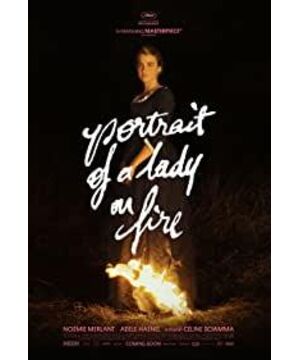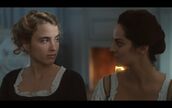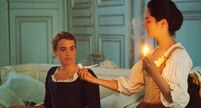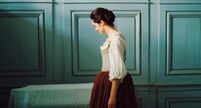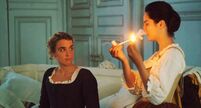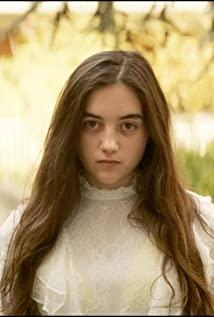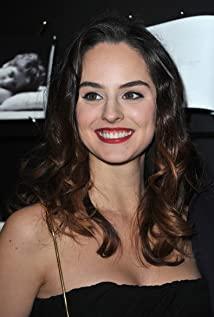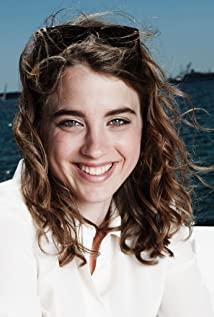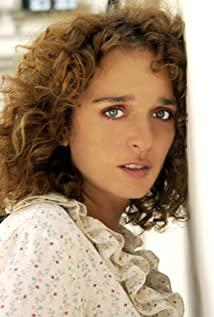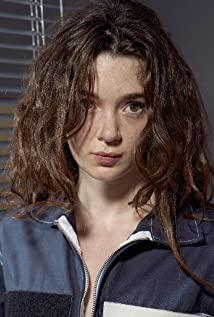Author: Amy Taubin (Film Comment)
Translator: csh
The translation was first published in "Iris"
Reporter: There are many films that focus on male artists and women who inspired him. To what extent have you considered these works?
Celine Sianma: I don’t have to think too much about this. We are basically familiar with the story you tell, so I don’t need to answer this question. What I want to tell is another story, not in a preaching way, but in a very emotional, emotional, and political way. The core concept of this film is that there is no "muse", in other words, "muse" is just a beautiful vocabulary. It is used to hide the truth of the facts and prevent us from knowing the true nature of the collaboration between women and artists. Way. I want to portray that kind of intellectual dialogue. Don't forget that there are several different brains in a room at the same time. We have seen that art history has reduced the connection between artists and their partners: before, the Muse was the woman sitting in the room. She was silent, beautiful, and at the same time fascinated by others. And now we know that Picasso’s "muse" Dora Mar is a great surrealist photographer, and Francis Picabia’s partner Gabriel Gabriel Buffy-Picabia Also actively participated in his transformation. I want to portray this reality, and at the same time, in the process of making a movie, I also want to have a strong connection with my actresses.
Reporter: Compared with your previous films, is there any difference in the cooperation in this work? In other words, are you cooperating more consciously?
Celine Sianma: Yes, this is mainly because, before this film, I have only worked with very young non-professional actors-children, girls, I will let them be in front of the camera actress. Working with non-professional actors is a completely different experience, because you have to fully design their restrictions. There is no room for negotiation, so you have to bear heavy responsibilities. However, if you work with adult women and professional actresses, these restrictions do not exist. Even when you work with them, they will surprise you, so this is not the same cooperation model at all. This is indeed a big step I want to take with this movie.
Reporter: This is a great love story-and few movies talk about lesbian desire among adults.
Celine Sianma: Well, "Carol" is an example. But when I found it here (referring to Cannes), my feelings were exactly the same as what you described. I think I rarely see such a movie.
Reporter: The sexual scenes in this film and the relationship between them and the spiritual life of these women are very complicated. From this point of view, it is much more complicated than "Carol". This is more like a concessional sex.
Celine Sianma: Yes, I am obsessed with a certain idea, and in the process of making this film, this idea has become more and more important. The actors have really made this idea the core of the film: I want an equal love story. You rarely see this kind of thing, but I think it is possible because there is something in their story. "Queer sex." I knew Adele Hanel would be involved, but when I met Nomi Merant during casting, I was totally shocked by this equality-same age, same height , The same temperament-I thought to myself, well, this is the core of this movie: equality. Even in friendship, even in discussions with Eloise's mother, and even in loving conversations, there is a certain horizontal dialogue. In addition, the artist does not occupy a dominant position—the gaze she casts can be said to be as much as the gaze she receives.
Reporter: Another thing worth noting is that there is a community of women on this island, and there are no men here. Has there been such an example in history?
Celine Sianma: It's not that there are no men on this island. In fact, they are just not in the picture frame. I'm not trying to describe a "Wonder Woman" island, but historically speaking, if we are by the sea, then the man will be the navigator and the woman can be alone. I read (someone said) that this is an "impossible love", but I don't want to describe it as an impossible love. I see it as a possible love. When I show this love story, I have given out all its potential. Because the basis of this film is actually the memory of a love story, and even when I describe the loss, I want to show a bright path. The fact is that this feeling is alive, it is not tragic, and it is not over. This kind of love is liberation, and this film wants to show that it will only continue to grow and that it has a future. I don't want to portray it with borders, conflicts, or shame. I don’t even think that these factors existed at the time—at that time, even a term that defined lesbianism did not exist—so, that’s why there are no men, because we know it’s just a picture frame, we know They are there.
Reporter: Another dramatic scene was the abortion scene on the bed. The women take care of each other's bodies and are responsible for each other in that unique way. At the same time, there are children in the bed. This is really amazing.
Celine Sianma: We made the movie for those scenes—the scenes that drove you to build everything—of course, this scene is also indispensable. I realized once again that I had never seen such a sight (in history). When I was studying female painters, this was the most disturbing thing: I knew those stars — Elizabeth Vicky Le Brun, Angelica Kaufman — but what I didn’t realize was that they There are so many that there is even a flourishing art field. When I discovered the works of those painters that were erased by art history, I felt bored and sad. This is also because the scenes they wrote have disappeared from our lives. These stories about intimacy, the hearts, desires, bodies and private lives of these women in the paintings have also cut off contact with us, so I always want these scattered images to be reborn. This is not to say that this is just a simple illustration-it is not just an abortion scene, it is also urging you to find a unique image of yourself. When she had an abortion, the children who comforted her didn't just exist in an illustration—it was a new image that appeared in a lost image.
Reporter: Why did you use Vivaldi's "Four Seasons" in the film? What is the connection between the discovery of a piece of music and the discovery of falling in love?
Celine Sianma: I didn't want to use the soundtrack in this film. It may be a bit scary, because shooting a love story without a soundtrack is very challenging. But I hope that the audience and the characters are in the same position, to realize art together with them, to realize the hopelessness of romance-to realize the frustration and the importance of art to our lives. Of course, there is also "beauty". "origin of. So, when music appears, I hope it will be eye-catching and let the audience realize how precious it is. The reason why I use Vivaldi is because I want to choose music that everyone knows, and I want a popular piece of music, so that the audience can identify with it more quickly and listen to it again-this is Vival First, but it is also a memory of Vivaldi. This film deeply explores the importance of art in our lives because it can comfort us; at the same time, this work also tells us how love can lead us to love art. The last shot contains all the levels mentioned above.
Reporter: Hanel is such an amazing actress.
Celine Sianma: She is the best. What can I say? We know each other very well, so we have the confidence that we can take the risk to create something brand new for Adela Hanel-how she pronounces, how to move... are all brand new tasks.
Reporter: She once handled those contemporary roles well, but now she interprets a period drama.
Celine Sianma: Yes, it seems easy to say, but she does bring this woman from the past back to life, because she is such a "contemporary" woman, so all of this will explode before our eyes. When people knew that Adele was on the cast, they expected it. However, they also predicted that she would play a painter because they would not have imagined all this... Some people tried to convince me that she should be a painter, but I refused.
Reporter: Do you think that the green dress of her character is related to the green dress of Madeleine in "Victorious"?
Celine Sianma: I don't think so. However, when we first saw Eloise's face, I would think of Madeleine's bun. During the choreography (of the scene of "Portrait of the Burning Woman"), we followed her on a long journey. At certain moments, we would look at her hair from behind, and then I would Think of that hair bun. This illusion was of course awakened by "Victorius".
In fact, there can be another level of reference, which is related to the discussion about the interpretation of the myths of Orpheus and Eurydice in various ways. Orpheus might rather have her memory than a real person, because Orpheus is an artist-I think this is a convincing point of view. I think that few people will look at this story from this perspective. But this is also a very cruel idea, because it means that he is willing to sacrifice Eurydice in exchange for memory.
It is true, but there is also another point of view, as Eloize said, perhaps Eurydice also said "turn around." I can’t decide who is right, but I really hope that she will have a heated, intellectual debate with Marion, (let us) see them thinking together, this kind of thinking is inherent in their (artistic) Cooperation is also at the core of their love dialogue. Because I want to describe very accurately—to mobilize all film art—the process of delay, frustration, and falling in love step by step. I want to describe the intellectual process of falling in love. She will admire and surprise the person in front of her. Then, she will suddenly create a language, and a spark will be ignited in her heart. This is why I cannot make a choice in Orpheus' argument.
View more about Portrait of a Lady on Fire reviews


